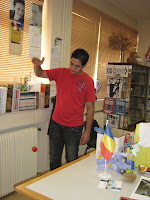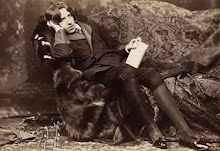
Not long ago we sent our frienship gifts to Romania.
Among others were included:
1. A silver boat for you to visit us.
2. A mask so that you can see our true face behind it
3. Old (drachme) and new greek coins (euro) to see both sides of things and the old and new element.
4. Bookmarks, so that you always find your way in our common books.
5. The school newspaper
6. Gadgets from the National Book Center of Greece
7. A documentary about our town called The Mourning Rock
8. Dracula teeth, worn in the Greek Carnival, were people dress-up.
9. A hand-made card with a wreath of branches from our schoolyard's trees.
(Suggestions and symbolism by the Greek Reading Club)All things have a symbolic meaning and are related to our book.
Yesterday we received a parcel from ION GHICA Colegiul Economic.
To our delight it contained a Treasure from Romania. The handwritten letter read:
"Dear friends,thank you fro your gifts and we hope you enjoy what we sent you.
The bracelets are made with our very hands in the colors of the Romanian flag. Alexandra made a doll from a wooden spoon and we hope it will put you a smile upon your faces. The rings represent the connection between Romania and Greece.We wanted to stick to the theme so we bought lots of things about Dracula.
Best wishesDiana, Anea, Denisa, Alexandra, Mihaela, Alina, Ioana and Ms Carmen"

You can see from the photo, that it did put a smile on our faces, Alexandra!
Our members are wearing your bracelets.We cannot thank you enough for the treasure!
Οι συνεργάτες αντάλλαξαν μέσα στο Μάιο πακέτα με δώρα διαλεγμένα από τα μέλη των Αναγνωστικών Λεσχών, ώστε να έχουν συμβολική σημασία π.χ. ένα καραβάκι όχι μόνο θυμίζει το ταξίδι του Δράκουλα στην Αγγλία αλλά αποτελεί πρόσκληση για Ελλάδα, τα  νομίσματα παραπέμπουν στο θησαυρό του Δράκουλα αλλά δείχνουν το παλιό και το νέο, που αποτελεί και θέμα του βιβλίου, κ.ο.κ. Από τη Ρουμανία λάβαμε ολόκληρο θησαυρό με αναμνηστικά του Targoviste. Τα δακτυλίδια είναι ο σύνδεσμος μεταξύ μας, και οι μαθητές μας ήδη φοράνε τα χειροποίητα βραχιόλια στα χρώματα της Ρουμανικής σημαίας!
νομίσματα παραπέμπουν στο θησαυρό του Δράκουλα αλλά δείχνουν το παλιό και το νέο, που αποτελεί και θέμα του βιβλίου, κ.ο.κ. Από τη Ρουμανία λάβαμε ολόκληρο θησαυρό με αναμνηστικά του Targoviste. Τα δακτυλίδια είναι ο σύνδεσμος μεταξύ μας, και οι μαθητές μας ήδη φοράνε τα χειροποίητα βραχιόλια στα χρώματα της Ρουμανικής σημαίας!
 νομίσματα παραπέμπουν στο θησαυρό του Δράκουλα αλλά δείχνουν το παλιό και το νέο, που αποτελεί και θέμα του βιβλίου, κ.ο.κ. Από τη Ρουμανία λάβαμε ολόκληρο θησαυρό με αναμνηστικά του Targoviste. Τα δακτυλίδια είναι ο σύνδεσμος μεταξύ μας, και οι μαθητές μας ήδη φοράνε τα χειροποίητα βραχιόλια στα χρώματα της Ρουμανικής σημαίας!
νομίσματα παραπέμπουν στο θησαυρό του Δράκουλα αλλά δείχνουν το παλιό και το νέο, που αποτελεί και θέμα του βιβλίου, κ.ο.κ. Από τη Ρουμανία λάβαμε ολόκληρο θησαυρό με αναμνηστικά του Targoviste. Τα δακτυλίδια είναι ο σύνδεσμος μεταξύ μας, και οι μαθητές μας ήδη φοράνε τα χειροποίητα βραχιόλια στα χρώματα της Ρουμανικής σημαίας!On the left, Muslum is trying the yo-yo you sent!
Αριστερά, ο Μουσλούμ δοκιμάζει το πάντα δημοφιλές γιο-γιο. Τα δώρα από τη Ρουμανία είναι αντικείμενα θαυμασμού από καθηγητές και μαθητές, και φέρνουν κόσμο στη Βιβλιοθήκη.


























